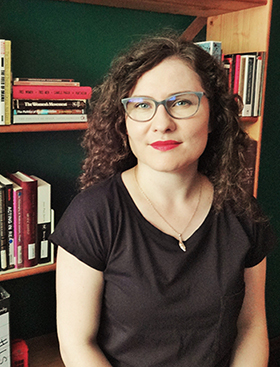
The African college of excellence in the social and human sciences

Dr Lida Krüger
At this year’s Research & Innovation awards ceremony, Dr Lida Krüger received the 2018 Senate Publications Committee Thesis Publication award for her thesis entitled The actual versus the fictional in Betrayal, The real thing and Closer. The award recognises the best thesis by a doctoral graduate of Unisa each year and entails conversion of the research into a manuscript for publication by Unisa Press. Krüger’s field of research is in drama and theatre studies.
I was honoured to win the award. For any researcher, having his or her thesis published as a book is very exciting. What I appreciated most about this opportunity was that it enabled me to publish my doctoral research in its entirety, without having to break the golden thread that runs throughout the thesis.
I am interested in the implications of performance in drama and theatre. The intention of performance distinguishes theatre from the other literary genres. The moment a text is performed in front of a live audience, it takes on a significance which it would not have otherwise. This significance functions differently in different plays and I find it fascinating to see how playwrights respond to the performance orientation of the genre.
In technical terms: To demonstrate how Harold Pinter, Tom Stoppard and Patrick Marber define and explore the concept of authenticity in the fictional and the actual through their metatheatrical plays Betrayal, The real thing, and Closer; to show how arbitrary the construction and mediation of the characters’ identities are from the perspective of the other characters as well as that of the audience; to show the significance of the role that the audience fulfils in these plays, not only within the fictional world of the play, but also in the actual world of the audience; and to show how issues of authenticity, fictionality and dishonesty impact on a genre that by definition depends upon illusion.
In layman’s terms, I intended to show that the three plays in question suggest that the fictional is not something outside of everyday existence. The fictional is not something we only encounter in plays or novels while our everyday lives are real or authentic. Fictionality permeates every aspect of our existence. This is demonstrated brilliantly in these plays when they present the stage as a fictional sphere and the auditorium as an actual (or real) sphere and then blur the boundary between the two.
Live theatre. I try to attend the theatre as regularly as possible. While every play that I see is not necessarily very innovative or very good, there are times when I am absolutely blown away by what I see on stage. I was in Hamburg, Germany, for the Performance Studies international conference in 2017 and a play that I saw there, Belarus Free Theatre’s Burning doors, by Nicolai Khalezin and Natalia Kaliada, was unlike anything I’ve ever seen before. This shifted the way that I thought about theatre and can possibly lead to new research projects. Also in 2011 I was in London for a conference and saw Sam Holcroft’s Edgar & Annabel at the National Theatre. This play was perfectly applicable to the topic of my thesis and in 2016 I published an article about it, Stop putting words in my mouth!’: Undermining the binary between the actual and the fictional, in New Theatre Quarterly. I see this article as an extension of my thesis.
I think there are so many experiences and events that ultimately shape one’s interest in a particular research field. I’ll single out the night that my mother and my aunt took me, my sister and our cousins to see The sound of music in the Sand du Plessis theatre in Bloemfontein in 1992. I’ve loved theatre ever since.
Well, this prize and the book that it resulted in. Apart from that, I am quite proud of my article in New Theatre Quarterly.
* Interview by Tshimangadzo Mphaphuli, Senior Journalist, Department of Institutional Advancement
Publish date: 2019-04-01 00:00:00.0